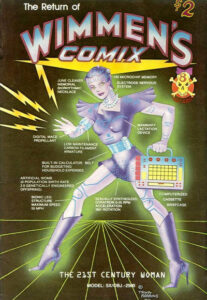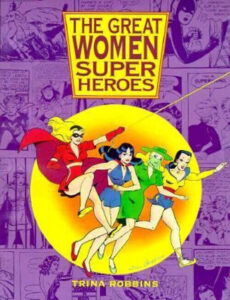Trina Robbins, 1938-2024
by Will Morgan 12-Apr-24
The pioneering underground cartoonist was an advocate for historical and contemporary female comics creators.
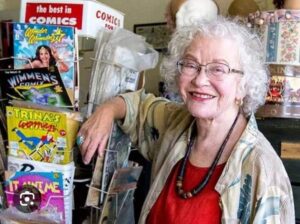 The pioneering underground cartoonist and comics historian Trina Robbins died on Wednesday, 10th April, at the age of 85, from the effects of a stroke which left her hospitalised in March of this year.
The pioneering underground cartoonist and comics historian Trina Robbins died on Wednesday, 10th April, at the age of 85, from the effects of a stroke which left her hospitalised in March of this year.
Born Trina Perlson in Brooklyn, New York, as a young girl she read comics voraciously, provided they featured strong female characters, her favourites being the Marston/Peter Wonder Woman and the jungle heroines of Fiction House, such as Sheena, Queen of the Jungle.
A member of science fiction fandom in the 1950s and 1960s, her illustrations frequently graced science fiction fanzines. In the 1960s, before she turned her attention back to to comics and to the women who make them, Trina was an accomplished clothes designer and seamstress who outfitted rock stars such as Donovan, Mama Cass Elliot and David Crosby. She became a notable figure in the hippie communities of New York City and San Francisco, and in Los Angeles caught the eye of Joni Mitchell, who name-checked her in the first verse of Mitchell’s ‘Ladies of the Canyon’, featured on Mitchell’s 1970 album of the same name
In the late Sixties, Trina’s cartoons began appearing in the counter-culture newspaper, The East Village Other. In 1969 she designed the costume for Warren Publishing’s Vampirella, though she later criticised how other artists had abbreviated her original design into something ‘bordering on obscene!’
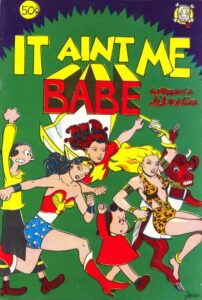 In 1970, she left New York for San Francisco, which became her home for the rest of her life. She curated the first underground comix anthology with an entirely female creative team, It Ain’t Me Babe, and in 1972 was a founding member of the Wimmen’s Comix Collective. Their flagship title, Wimmen’s Comix, which ran, off and on, for more than twenty years, brought attention to, or featured the debuts of, many women who went on to become significant figures in the graphics field, such as Aline Kominsky-Crumb, Roberta Gregory, Lee Marrs, Diane Noomin, and others.
In 1970, she left New York for San Francisco, which became her home for the rest of her life. She curated the first underground comix anthology with an entirely female creative team, It Ain’t Me Babe, and in 1972 was a founding member of the Wimmen’s Comix Collective. Their flagship title, Wimmen’s Comix, which ran, off and on, for more than twenty years, brought attention to, or featured the debuts of, many women who went on to become significant figures in the graphics field, such as Aline Kominsky-Crumb, Roberta Gregory, Lee Marrs, Diane Noomin, and others.
In the early part of her career, she was for a time the only regular female presence in the overwhelmingly masculine and frequently misogynistic world of underground comix, and unafraid to call out her fellow creators, most notably Robert Crumb. ‘It’s weird to me how willing people are to overlook the hideous darkness in Crumb’s work … What the hell is funny about rape and murder?’
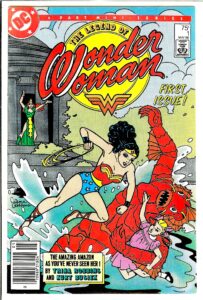 In the 1980s, she got the opportunity to co-write (and given that her name comes before that of scripter Kurt Busiek in the credits, the story is probably more hers than his) and draw her childhood heroine, with the Legend of Wonder Woman mini-series, the last story of the ‘old’ Wonder Woman before her post-Crisis relaunch; Robbins was the first woman to draw the character, at least in her own comic. She occasionally worked for mainstream companies with series such as Meet Misty for Marvel Comics’ Star imprint, but by the late 1980s she had shifted focus to a series of books spotlighting the undervalued, forgotten, or completely ignored contributions of women to the comics medium, giving the lie to the tired cliché, ‘women don’t do comics’. She said of this: ‘I truly believe this is my life’s work.’
In the 1980s, she got the opportunity to co-write (and given that her name comes before that of scripter Kurt Busiek in the credits, the story is probably more hers than his) and draw her childhood heroine, with the Legend of Wonder Woman mini-series, the last story of the ‘old’ Wonder Woman before her post-Crisis relaunch; Robbins was the first woman to draw the character, at least in her own comic. She occasionally worked for mainstream companies with series such as Meet Misty for Marvel Comics’ Star imprint, but by the late 1980s she had shifted focus to a series of books spotlighting the undervalued, forgotten, or completely ignored contributions of women to the comics medium, giving the lie to the tired cliché, ‘women don’t do comics’. She said of this: ‘I truly believe this is my life’s work.’
Her first such book, co-written with Catherine Yronwode, was Women and the Comics, a history of female comic-strip and comic-book creators. Subsequent Robbins volumes on women in the comics industry include A Century of Women Cartoonists (Kitchen Sink, 1993), The Great Women Superheroes (Kitchen Sink, 1997), From Girls to Grrrlz: A History of Women’s Comics from Teens to Zines (Chronicle, 1999), and The Great Women Cartoonists (Watson-Guptill, 2001). These volumes are the founding ‘pillars’ of her research into the history of women in comics, which produced over fifteen works in total. She also wrote several books of juvenile fiction.
However, she did not turn her back on either comics production or advocating for equality; in 1990, she co-edited Choices, a pro-choice anthology to raise funds for Planned Parenthood, following it up with Won’t Back Down in 2024, protesting the overturning of Roe vs. Wade. In 1994 she was a co-founder of Friends of Lulu, a non-profit formed to promote readership of comic books by women and the participation of women in the comic book industry.
I had the pleasure of meeting Trina on a handful of occasions, and was dazzled by her intelligence, insight and vigour—even though we remained diametrically opposed on the significance of Wonder Woman’s ‘Modesty Blaise’ years!
All of the above only skims the surface of a career which lasted more than half a century, but eclipsing even her formidable position as a comics creator, her greatest legacy will be her tireless championing, encouragement and mentoring of women artists and writers, many of whom, including Shary Flenniken, Roberta Gregory, Colleen Doran, Gail Simone and Wendy Pini, have been among the first to pay tribute to her guidance and support.
She is survived by her long-time partner, the artist Steve Leialoha; Casey Robbins, her daughter by fellow underground cartoonist Kim Deitch; a granddaughter; and her sister, Harriet Nadel.
Tony Keen adds: Unlike Will, I was never lucky enough to get to meet Trina. But I have long been aware of her as an artist, with a style that was very much out of fashion in mainstream comics of the past sixty years, but is utterly charming, and of her scholarship. I am currently working on a piece on George Pérez’s Wonder Woman. This involves reading the strip she drew for Wonder Woman Annual #2; she also appears as a character in other parts of the same annual, drawn by the great Ramona Fradon, whom we also lost this year. And, of course, The Great Women Superheroes has been at my elbow as I write.
Tags: Trina Robbins, Wimmen's Comix, Women's comics, Wonder Woman